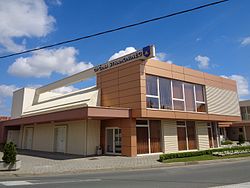Strahoninec
| Strahoninec | |
|---|---|
| Municipality | |

Municipal building
|
|
| Location of Strahoninec in Croatia | |
| Coordinates: 46°22′N 16°25′E / 46.367°N 16.417°E | |
| Country |
|
| County | Međimurje |
| Government | |
| • Municipal mayor | Franjo Lehkec |
| Area | |
| • Total | 8.35 km2 (3.22 sq mi) |
| Population (2011) | |
| • Total | 2,682 |
| • Density | 320/km2 (830/sq mi) |
| Time zone | CET (UTC+1) |
| • Summer (DST) | CEST (UTC+2) |
| Postal code | 40000 Čakovec |
| Area code(s) | 040 |
| Website | www.strahoninec.hr |
Strahoninec (Hungarian: Drávanagyfalu) is a municipality in Međimurje County, Croatia.
Strahoninec is the only village in the municipality. Also part of the municipality is the hamlet of Poleve, located just over a kilometre south of the village. In the 2011 census, the municipality had a population of 2,682. Of the entire population, a total of 2,645 people (98.6%) identified themselves as Croats.
The village of Strahoninec is located next to the southern limits of Čakovec, the county seat of Međimurje County, around 3 kilometres from the centre of the city. The north-eastern part of the village is connected with Savska Ves, while its western part is close to Nedelišće.
In 1478, the village was listed as Strahoninecz in the list of settlements belonging to the Čakovec area. In 1564, Judicatus Strahonincs was mentioned. At the time, a judicatus was an administrative division consisting of several rural municipalities. In 1672, Strahoninec was mentioned as part of the Nedelišće judicatus. In 1718, it belonged to the Mihovljan judicatus, but was again mentioned as part of the Nedelišće judicatus three years later, in 1721.
The first organised census in the Međimurje region took place in 1786. According to it, there were 44 houses in Strahoninec, accommodating 56 families and a population of 384. Another census took place in 1828. According to it, there were 48 houses in the village, accommodating a predominantly Roman Catholic population of 385. The name of the village in that census was Ztrahominec. It was derived from strah, the Croatian word for "fear", and minuti, which means "to pass" or "to go away". It was a reference to the people who travelled through the area. They were afraid of a large forest they had to go through after crossing the Drava, and their fears were gone once they entered the village.
...
Wikipedia

